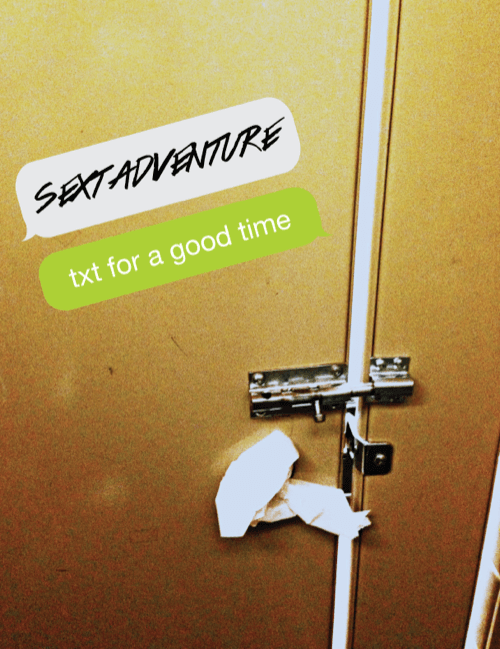
Editor’s Note: This piece was originally published by our partners at Kill Screen.
The Sext Adventure booth at the Boston Festival for Indie Games stood out almost because it had little to distinguish it. While many of the other tables surrounding it had monitors, art, multiple people in matching T-shirts running around talking to attendees, Sext Adventure was almost calm, peaceful in a sea of chaos.
Kara Stone was going solo at the booth, sitting with her legs crossed behind the table, which featured little besides a decorated canopy with a chair beside it. Inside this canopy was a Samsung smartphone with the default SMS app open and a few messages already dotting the small screen.
For more stories about videogames and culture, follow@killscreen on Twitter.
I had been assigned by Kill Screen to interview Stone only the day before. I had done some preliminary research into her work, looking at the photos from her exhibition of Knitting Simulator (intriguing because I had recently taken up knitting), performing the breathing exercises assigned by Medication Meditation, but I had somehow missed Sext Adventure, which was the game—if you could call it such—on display here.

Sext Adventure is not really a game with win conditions so much as a sexual, cyberpunk and, at times, embarrassing experience. Through a phone’s text messaging application, you can get the chance to understand what it would be like to sext with a robot, exchanging pre-determined actions and photos that start off mostly innocuous but can become existentialist questions about human and robot nature and relations. The canopy was there at the booth, thankfully, so that you can click and open the images without becoming too frazzled that you were looking at porn in public.
It’s embarrassing, but that was kind of the point. Stone said that she’s tried sexting in the past but it was weird. She added that she felt like a robot while doing it.
“I can’t imagine it’s turning anyone on,” she said. “I’m 25, so I’m somewhat of the age of sexting, but maybe a little older. I feel like a robot, trying to understand why people like sexting and why it’s a thing that people find interesting or sexy.”
Sext Adventure was built on an engine created by Nadine Lessio, who previously had created a texting-based adventure game called Cat Quest. Stone wanted to explore the engine, which uses texting, and she, along with Lessio, came out of it with an idea that becomes more than just sexting with a robot. It becomes a reflection of how we approach sex and gender, how the technology we use has become incorporated into our intimacy. It’s more than just looking at some pornographic images and shock value, even though some people who check it out tend to miss the point, instead focusing on things such as the gender of the robot.
“Sometimes I get emails from guys saying ‘how do i make sexbot a woman,’” she says, “which makes me laugh because that’s not the point, to troll these dudes and send them dick picks.”
Challenging A Masculine Media And Culture
When looking at some of Stone’s other work, you notice that there’s a running theme and a sense of personal politics. Her experiences shine through these ruminations into what exactly makes a game, what it’s like to be a woman in the tech industry, and that in part lends itself to experimentation.
There’s more of an emphasis on interactivity than on traditional game-like, winning or losing mechanics, character or storytelling. What can you do with that interactivity? What points can you bring up when you bring in a player? Medication Meditation is something that touches upon the smaller, draining aspects of having anxiety. Cyborg Goddess, another title, provides a “cost-benefit analysis of two archetypes available for women” as you explore two stories that are usually available for female characters.

Accordingly, in Sext Adventure, Stone sought not to give people the opportunity to sext with a robot of their choice, but to instead let the player explore what that kind of relationship would be like, separate from the sexual aspects. It’s the opposite of what she said she would expect from a game with this kind of title, and it’s a fun side effect to surprise others.
See also: Meet Voltage, The Japanese Choose-Your-Own-Romance App Maker
“If I had heard about a sexting game I would assume it would be by a bunch of white dudes who think they’re being funny, aimed at other white dudes that are very heterosexual and very heteronormative,” she said. “But it’s fun to surprise them.” Because her work challenges the traditional definition of a game, she has had people say what she creates are “not games.”
“We don’t fit the typical game maker and therefore the games we’re making don’t get to be called videogames because it’s still seen as a very masculine media and culture,” Stone said, explaining what it’s like to be a female game maker. “People like to make up these rules but they’re only in place for. you know, women and trans people and gender non-binary people, people don’t think fit into the category or stereotype of video game maker.”
Gaming’s World Of Possibilities
Stone got her start at Dames Making Games, an organization that provides workshops and programs for women, non-binary, and queer people interested in games. Previously having studied filmmaking, Stone was struck by this seemingly novel concept, that she could make games. She joined a workshop called Junicorn that helped people make their first game. Six months later, she released Medication Meditation.
“I had been in art school forever and it was never an option, nobody was talking about it. It seemed like something that very tech-y white dudes did in California. That was a big shift for me,” she said.
Now she’s making games full time, in part because of this growing diversity in gamemaking circles. When faced with whether she was going to work for her PhD or go into games, Stone said she was at a crossroads. There’s little money in small, artist-driven games, and at least going to school would provide her with a sense of stability. However, the idea that there were groups of people, such as Dames Making Games, that were promoting diversity in storytelling and were experimenting with new mechanics and ways to make games, was very appealing.
See also: Hatsune Miku Is Here To Destroy Everything You Love (And Hate) About Pop Stardom
Many of the games available on her website are experiments in some way or another. Knitting Simulator, which was created in a game hardware jam, isn’t available to play, but from photos, you can see that it uses needles as controllers. Sext Adventure uses an engine rarely used on mobile to enhance the texting experience. It’s an approach to move games out of the fixed place it fell into, something that Stone and others think the medium desperately needs.
“Games are changing and there are so many radical people working in it now that it’s inevitable that super cool, inventive things that we’ve never seen before are gonna come out,” she said. “There’s just really a whole world of possibilities with games.”
Header illustration by Jordan Rosenberg
More From Kill Screen
- Call Of Duty: Advance Warfare Is, Thankfully, A Bit Grossed Out By War
- Games Could Learn A Thing Or Two From Confessional Poetry’s History
- Wes Anderson’s The Life Aquatic Gets Demade Into An NES Game
For more stories about videogames and culture, follow@killscreen on Twitter.

















